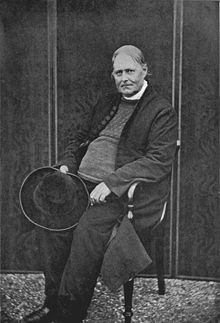Robert Hawker (poet)
Appearance

Robert Stephen Hawker (3 December 1803 – 15 August 1875) was a British Anglican priest, poet, antiquarian and reputed eccentric, known to his parishioners as Parson Hawker.
Quotes
[edit]- A good sword and a trusty hand!
A merry heart and true!
King James’s men shall understand
What Cornish lads can do.And have they fix’d the where and when?
And shall Trelawny die?
Here’s twenty thousand Cornish men
Will know the reason why!- "The Song of the Western Men", sts. 1, 2 (wr. 1824; pub. 1826)
- Waes-hael for knight and dame!
O merry be their dole!
Drink-hael! in Jesu’s name
We fill the tawny bowl;
But cover down the curving crest,
Mould of the Orient Lady’s breast.- "King Arthur’s Waes-hael", st. 1
- We see them not—we cannot hear
The music of their wing—
Yet know we that they sojourn near,
The Angels of the spring!They glide along this lovely ground
When the first violet grows;
Their graceful hands have just unbound
The zone of yonder rose.I gather it for thy dear breast,
From stain and shadow free:
That which an Angel’s touch hath blest
Is meet, my love, for thee!- "Are they not all Ministering Spirits?"
- They rear’d their lodges in the wilderness,
Or built them cells beside the shadowy sea,
And there they dwelt with angels, like a dream!
So they unroll’d the Volume of the Book
And fill’d the fields of the Evangelist
With thoughts as sweet as flowers.- "The First Fathers"
- There lies a cold corpse upon the sands
Down by the rolling sea;
Close up the eyes and straighten the hands
As a Christian man’s should be.Bury it deep, for the good of my soul,
Six feet below the ground;
Let the sexton come and the death-bell toll
And good men stand around.Lay it among the churchyard stones,
Where the priest hath bless’d the clay:
I cannot leave the unburied bones,
And I fain would go my way.- "Death Song"
- Thus said the rushing raven,
Unto his hungry mate:
‘Ho! gossip! for Bude Haven:
There be corpses six or eight.
Cawk! cawk! the crew and skipper
Are wallowing in the sea:
So there’s a savoury supper
For my old dame and me.’- "A Croon on Hennacliff", st. 1 (1864)

